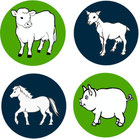Pigs/Piglets
Infections with Rotavirus

Rotaviruses belong to the non-enveloped RNA viruses, they are found ubiquitously. Almost every adult pig has suffered a rotavirus infection with corresponding antibody formation. They are among the most important pathogens in young animals, they are not very host specific and also are for a long time long infectious in the outside world and stables. After oral incorporation the viruses invade the intestinal cells (enterocytes) and destroy their function of resorption. Individual Rotavirus infections are often subclinical, with no disturbance of general health. But subclinical defecation is a source of infection for other animals. The so-called "two-week diarrhea" of piglets occurs between the 10th and 21st days of life.
It is characterized by low food intake, occasional vomiting and mild diarrhea. This leads to a rapid infection rate in which course the morbidity (disease rate) amounts to 100%, though the mortality rate (death) is only 50%. This phenotype occurs in piglets in the second to third week of life, in most cases simultaneously with the decreasing antibody content of the sow milk. In mixed infections with other diarrheal pathogens, worm infestation, existing primary diseases, poor hygiene and inadequate colostrum sustenance of piglets, severe diarrhea with significant losses due to deaths and stunted growth may occur. Motherless breeding is therefore particularly problematic.
Contact
Fassisi, Gesellschaft für Veterinärdiagnostik und Umweltanalysen mbH
Marie-Curie-Strasse 8
37079 Göttingen
Germany
info@fassisi.de
Phone: +49 (0)551 5008840



